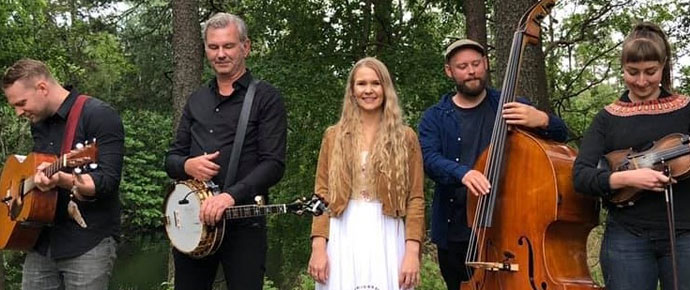
For the past eight years, the quintet that go by the odd name Dunderhead have been sharing their innate love of bluegrass in their native Sweden, making their music in the streets of their hometown, and as far afield as Europe and the U.S.A., where they’ve toured twice and performed at the IBMA. The group — which currently consists of Angelina Lundh (vocals, accordion), Mikael Grund (vocals, guitar), Agnes Brogeby (violin, vocals), Anders Ternesten (banjo), and Carl Karlsson (bass) — grew out of an earlier outfit called The Moonshine Brothers, and today they play bluegrass with an avid authenticity. Lundh recalls how it all began.
“I went out one sunny day to buy ice cream, and there were suddenly four guys playing bluegrass in the street just outside my house,” she says. “They called themselves The Moonshine Brothers and I immediately knew that I had to make contact and play with them in the future. A few months after, I was asked to record a song for a project called Sounds Like a Good Story, a book with stories and songs about the Swedes that migrated to America in the 19th century, and so I asked The Moonshine Brothers to do it with me. We instantly found each other in the music, and only three months after our first jam session, we were rewarded as the second best bluegrass band in Europe. The following year we got first prize.”
The group evolved from there. At the beginning of this year, Dunderhead’s original guitar player, Jimmy Hermansson, quit the band and Mikael Grund, who had played mandolin in the group, switched to guitar. More recently, Agnes Brogeby joined the group on violin and vocals.
The group found a common bond. in their respective influences, all of which were expressed through the band’s first — and to date, only — album in 2015. A new effort is expected next year.
“I grew up listening to Dolly Parton and Alison Krauss, but never met anyone who played bluegrass until I started playing in this band,” Lundh explains. “Mikael listened to Hank Williams and Johnny Cash, and played in both rock and rockabilly bands before he started playing bluegrass in the groups Lonesome Mountaineers and Downhill Bluegrass Band. Anders remembers how he heard Earl Scruggs play his five string banjo on the radio, and knew right there and then that he wanted to play bluegrass. Carl got to know bluegrass just a few years back after playing jazz and rock his entire life. Agnes got into old-time music through her parents who are musicians, and from there she found her way into bluegrass.”
Lundh notes that while it may not be apparent at the outset, there are certain similarities between bluegrass and the traditional music of the group’s native Sweden. “Swedish folk music is probably more similar to old-time bluegrass,” she muses. “It is focused on the violins playing melodies to different rhythms with associated dances. We do have a singing tradition — ‘Visa’ as it’s called in English — that might be more like American folk songs. And of course, there’s the ‘Kulning’ that was used to call in the cows in the mountains.”
It’s little surprise then that the reaction at home has been very positive. “Not everyone is familiar with bluegrass,” she suggests. “We play a lot in the streets of Gothenburg, and our experience is that once people get to hear it live, they are hooked. Last week, we did a show at a free festival in Gothenburg and got to play on a big stage on the main street. A lot of people that had never even heard of bluegrass or banjos stayed and listened to the whole concert, and after the show they had so many questions! ‘What is this?’ ‘Why have I never heard it before?’ ‘Where can I get more?’”
Nevertheless, bluegrass remains a rarity in Sweden. “The bluegrass community is not big, but it is strong,” Lundh insists. “There is a small bunch of bluegrass festivals, and many more country festivals that sometimes book bluegrass bands. But it is not like in the U.S. At least not yet. We are working on it.”
And they’re doing so diligently it seems. The group writes its own material, but mixes it with a few choice covers during their live performances. Likewise, they’ve also managed to do some networking. Lundh says they became good friends with Jeff Scroggins & Colorado when they played Germany’s GrevenGrass festival in 2014, and they subsequently connected with them again in The Netherlands, Sweden, and the U.S. in the years after. “They’re amazing musicians and great people,” she says.
In addition, various members of Dunderhead had the opportunity to play with Rob Ickes and Trey Hensley when the duo visited Sweden a few years back.
Asked why she thinks bluegrass has such appeal, Lundh points to “the energy, the sound and the songs.” “It’s simple, yet complex at the same time,” she maintains. “You can jam with professionals when you’re a beginner, although it’s not easy to play.”







